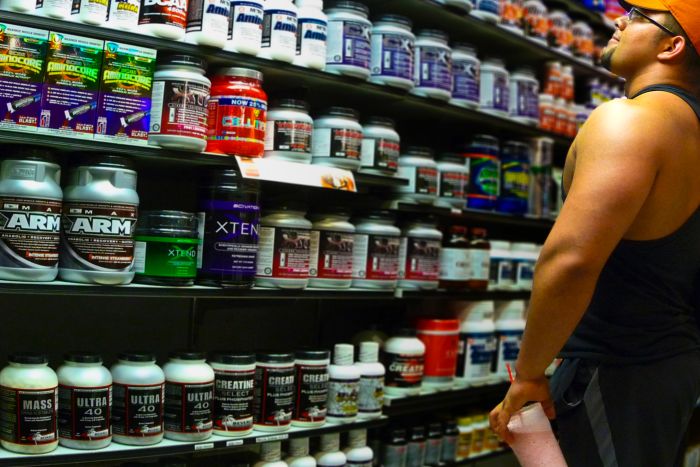 Now, more fitness buffs want to hit the ground running, so to speak.
Now, more fitness buffs want to hit the ground running, so to speak.
The Australian Institute of Sport says there is a “trend” towards the use of pre-workout supplements, and body building companies are also citing an increase in demand.
Many users liken the effects to “being on speed”, and experts say some products contain ingredients used in so-called “party drugs” and banned in competitive sports.
What’s more, those who frequently use pre-workout supplements are becoming dependent on their energy hit.
Last week, one product was banned in some Queensland mines because it was being used by workers to stay awake on the job. There were also concerns miners were “hyped up” on the heavily-caffeinated supplement while operating machinery.
It is not just the mines where people are misusing the powerful, powdered formulas.
One 25-year-old professional from Brisbane, who wanted to be known only as “Emma”, says she takes pre-workout supplements three times a week on average.
“It seems to give you intense focus,” she said.
“One of the girls I work with was telling me she doesn’t like exercise at all, she never feels like going to the gym. Since taking it she would go, and then want to go to the gym again straight away, like have enough energy to want to do it all over again.
“I mainly just like to run, so being able to run for a lot longer and have a lot more energy without feeling fatigued and tired.”
Emma’s friends, who introduced her to the product, also take it when going out at night for an extra “kick”.
She says she barely ever exercises without consuming her pre-workout supplement, despite feeling side effects like pins and needles and tingling.
“It’s just that it makes you feel a lot more focused, it gives you a lot more energy, you enjoy it more, you want to be there and you push yourself further than what you would if you don’t take it,” she said.
“I’ve heard people liken it to speed, I’ve never actually tried that alternative, but it’s kind of like an intense form of super energy drink that really makes you feel like you’ve got a lot of energy.”
Increasing demand
Fabian Di Marco, a 26-year-old personal trainer from Sydney who runs an online supplements company, says there are dozens of pre-workout products on the market.
He says the range continues to grow as demand increases.
“When we first started we were probably only making about 10 per cent of sales for pre-workout supplements, now they probably account for 35 per cent, so it’s more than doubled,” he said.
He says although every product is different, the baseline ingredients are similar.
“Most pre-workout supplements have things like electrolytes, amino acids, arginine, glutamine, caffeine, and a lot of them have nitric oxide,” he said.
“With pre-workout supplements, because a lot them have so many stimulants which give you a tingling feeling, and caffeine, you feel the effect of the supplement straight away.
“So what these things are designed to do is give you more energy for longer workouts and give you more focus while you’re working out, increase your metabolic rate and things like that.”
Most products also contain 1,3-Dimethylamylamine, or DMAA – an ingredient which is banned from competitive sport in Australia and is commonly found in the make-up of so-called “party drugs”.
Mr Di Marco says in Australia, some pre-workout supplements are required to have reduced dosages of ingredients like DMAA.
But he says problems still occur when the formula is misused or sold incorrectly.
“The problems you hear about most of the time when taking these type of supplements are a result of misuse,” he said.
“People are already over-fatigued and taking it when they should be resting. Or they increase serves above dosage. That’s abusing the product, and that’s when the trouble occurs.
“If you only want it for the stimulation and you want it to overstimulate, like you would a drug, that’s completely misusing it, you’ll have the negative effects, so there’s definitely the downside of becoming addicted to it because you want that feeling of energy.
“But if you use it for the positive and only for the positive then you’ll have those positive results.”
Education need
He says companies that sell pre-workout supplements need to play a far greater role in educating their customers.
“People who hear about these pre-workouts, they know as soon as they take it they get energised, they feel the effects, and a lot of people do become reliant on having these effects to get the same energy for working out, so that’s why it’s up to the companies to provide advice and solutions to what the consumer actually needs,” he said.
“Our first question to the consumer would be well, do you actually need it, and then if you do need it, which one is actually suited to your goal?
“Do you need one that provides more electrolytes and nutrition rather than an energy boost?
“It come back to the responsibility of the company that sells these products, because you shouldn’t just sell something to someone just because they want it, it all comes down to what is their need and then educating them for the process.”
Product labelling
Greg Shaw, a senior sports dietician from the Australian Institute of Sport who specialises in supplementation, agrees the public need to be better educated in terms of what they are consuming.
He says in the past 12 months, many athletes have returned positive doping tests after taking pre-workout supplements and not realising what was in them.
“There are products available on the market where you can’t tell how many stimulants are in there, or how much caffeine is in there, they just get grouped under a blend of ‘key ingredients’, so you have no way of knowing what’s actually in there,” Mr Shaw said.
“Also, some of the heavier stimulants can be named under their herbal name, or under their chemical name, and then they’ve also got their common name, so people just don’t know what they’re taking.”
He says the products are also far too readily available.
“It seems that these things are appearing on our shelves without the regulation that needs to be around them, and the availability of them is very poorly regulated. Anyone can walk into a dietary supplement store and buy pretty much what they want without knowing the exact circumstances in which they’re going to use it, their diet history, their family history of heart disease,” he said.
Mr Shaw says there is definitely a “trend” towards young people using these types of products, which nowadays are as socially acceptable as a cup of coffee or an energy drink.
He is calling for better education around what is contained in pre-workout supplements, as well as government regulation around clearer labelling.
“Make sure you know what you’re taking and make sure you stick with reputable Australian companies,” Mr Shaw said.
“The list of ingredients on some of these products can be like reading a pharmacology list, and most of the time they look at the big things and go ‘oh yeah the rest of it is just herbs and that is OK’, whereas most of the time the real problem is in these herbal derivatives and that’s where the harm comes.”






